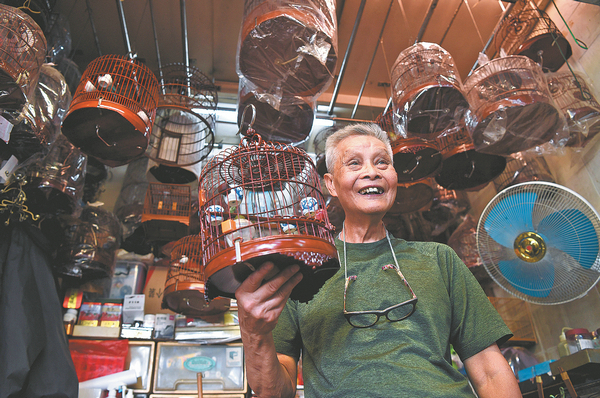
Hong Kong's Master Birdcage Maker Keeps Tradition Flying High

Chan Lok-choi, one of Hong Kong's last remaining birdcage makers, also known as "Uncle Choi". CHEN DUO/XINHUA
HONG KONG — Amid the bustling Kowloon Flower Market in Hong Kong, enveloped by the sweet melodies of chirping birds, you'll find one of Hong Kong's last remaining birdcage makers — Chan Lok-choi, also known as "Uncle Choi".
The 81-year-old craftsman began his apprenticeship at the young age of 13 under the guidance of his uncle, a renowned birdcage maker. Since then, he has become a master in the art of crafting traditional birdcages and has made a name for himself in the industry.
The culture of bird-keeping and birdcage-making has been deeply rooted in Hong Kong society since the 1920s and 1930s. It became an essential pastime for many Hong Kong citizens and contributed to the development of the local birdcage-making craft.
In the past, many teahouses would hang birdcages outside their shops, and bird owners would bring their birds to the teahouses to socialize with other bird enthusiasts. Birdcage making is not just a craft but also a cultural symbol of Hong Kong's unique identity. It represents the city's connection to traditional Chinese culture and the importance of nature and harmony in the lives of the people.
"When I was in school, I always had a knack for handicrafts, and birdcages are one of the most artistic crafts," Chan says. In the 1950s, making birdcages was a niche skill. Many people chose to learn other trades such as hairdressing and carpentry.
Despite his young age at the time, Chan was drawn to the exquisite birdcages that hung high above, and he knew he had found his calling. "I had a sudden realization: What if the master of birdcage making retired one day? Who would continue this craft? With that in mind, I firmly decided to learn how to make birdcages," he says.
In the 1960s and '70s, Hong Kong had an abundance of skilled birdcage makers, and Chan was not yet a household name. He tried his hand at other industries to make ends meet, but he always found himself gravitating back to the craft of making birdcages.
"Making birdcages is still my favorite thing to do. No matter what other work I do, I can't let go of it," he says.
Birdcage making is a skillful combination of bamboo and woodworking, requiring only bamboo, knives, paint, and "a pair of hands". The birdcage maker must have precision and knowledge to create a new world for birds.
To make a simple birdcage, at least 48 bamboo strips are required, each one meticulously carved to ensure symmetry and evenness. The bamboo is then heated with a kerosene lamp to create the appropriate curvature for the cage, before being threaded through small holes in the bottom of the cage. Skilled artisans carve patterns on the cage's bottom and feet to create a stunning visual effect. Crafting a single birdcage takes anywhere from a few months to several years.
Chan once spent nearly two years making a birdcage for his beloved pet bird. The cage was designed with an added layer to provide more space for his bird to jump and play.
In recent years, the popularity of bird-keeping and birdcage-making has declined, leading to a gradual decline in the craft of making birdcages. However, "Uncle Choi "continues to operate his business every day, repairing birdcages for loyal customers and old friends. He believes that repairing birdcages is just as important as making them.

Designer Kwok Dylan, one of Chan's apprentices, prepares bamboo to make a birdcage. CHEN DUO/XINHUA
During the repair process, he studies the original makers' craftsmanship and imitates their techniques. He believes that repairing birdcages is an opportunity to learn from other craftsmen and preserve the beauty of the original design.
The craft of birdcage making in Hong Kong has been recognized as a traditional handicraft and listed as an intangible cultural heritage in 2014. Despite the decline in popularity, exquisite craftsmanship continues to attract young people to learn it.
Chan has taken on eight apprentices from various professions, including design, finance, and dance. They come to his shop regularly to learn the techniques of birdcage making, and he encourages them to observe the process first to ensure they have the patience and perseverance required for the craft.
For the apprentices, birdcage making is not only about overcoming technical difficulties but also a rewarding experience of creating something from scratch. Designer Kwok Dylan, one of Chan's apprentices, has even published a book on Hong Kong's bird-keeping culture and birdcage crafting, hoping to revive interest in this traditional craft.
Despite the challenges, Chan remains optimistic about the future of birdcage making. He believes that with the previous generation passing on their knowledge and the next generation willing to take up the craft, the tradition of birdcage making can be preserved and continued.